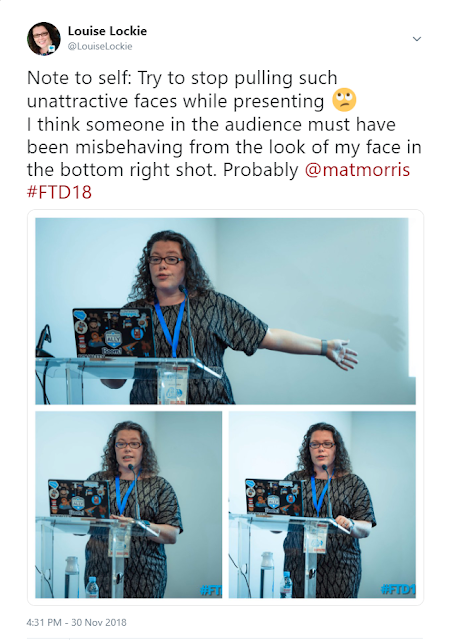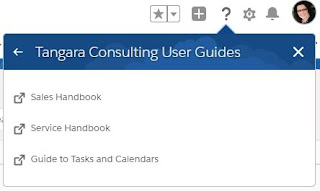Boost Not Berate
Sometimes we have moments of self-assessment and clarity, and they are not always positive.
I talk to myself, I know this, but I have only just taken real note of the fact that so much of my narration is self criticism.
For example, I called myself stupid 3 times putting the washing out the other day. How one can hang the washing out incorrectly I don't even know, but I judged that I had made a mess of it.
More often, as someone who spends much of my working day trying to get Salesforce to do what I want it to, and often not immediately succeeding. It is not unknown for me to be sat, literally head in hands, muttering at my inability to triumph before spotting my mistake, and, of course, berating myself for making said mistake.
Why do we do this?
I tell myself to stop picking on myself but its a habit I slip back into with ease.
This week French Touch Dreamin' released the photos taken at the event here.
As a presenter at the conference there were photos of me delivering my session. I was focused on the talk and the audience, not the photographer, and so the pics are obviously not posed portraits. Instead of recognising this fact, I zeroed in on my facial expressions and took to Twitter to call myself out.
Interestingly, several women joined me and shared pictures of themselves and added their own self-criticism. Even more interestingly I didn't see the same reaction from any men, although I am sure they don't look like super models in every snap they appear in.
I am familiar with the phrase we can be our own worst enemy, the Women in Tech group I co-lead in London even had a session on this very subject at the beginning of the year. Awareness is important but it obviously isn't enough as we (and certainly I) continue to beat ourselves up.
OK, so I have identified the problem but how do I counter it?
Recognise, Acknowledge, and Celebrate Successes
In previous posts I have talked about the importance of setting ourselves goals, and celebrating when we achieve these goals. This is important but we should also congratulate ourselves on the small wins as well as the big ones, and it certainly shouldn't wait until an end of year review.
Keeping a record of your achievements can serve several purposes:
This sort of exercise shouldn't be restricted to your professional life though. Google's #IamRemarkable initiative reminds us to acknowledge and highlight our achievements as a first step towards using self-promotion to bring us more successes, in the workplace and beyond.
Earlier in the year, at another London Women in Tech meeting, we held an #IamRemarkable workshop and our members took the time to list the accomplishments of which they were most proud. Happy relationships, raising children, getting through illness, supporting others through hard times, were all listed alongside restarting careers, certifications, and academic achievements.
At the start of the session I stared at the blank page, worried that I have nothing to celebrate, but of course I did, and once I not only acknowledged them, but wrote them down, as well as share them with the group, I felt a boost.
That's what I need more of. I need to give myself a boost and stop berating myself.
I bet you do too.
I talk to myself, I know this, but I have only just taken real note of the fact that so much of my narration is self criticism.
For example, I called myself stupid 3 times putting the washing out the other day. How one can hang the washing out incorrectly I don't even know, but I judged that I had made a mess of it.
More often, as someone who spends much of my working day trying to get Salesforce to do what I want it to, and often not immediately succeeding. It is not unknown for me to be sat, literally head in hands, muttering at my inability to triumph before spotting my mistake, and, of course, berating myself for making said mistake.
Why do we do this?
I tell myself to stop picking on myself but its a habit I slip back into with ease.
This week French Touch Dreamin' released the photos taken at the event here.
As a presenter at the conference there were photos of me delivering my session. I was focused on the talk and the audience, not the photographer, and so the pics are obviously not posed portraits. Instead of recognising this fact, I zeroed in on my facial expressions and took to Twitter to call myself out.
Interestingly, several women joined me and shared pictures of themselves and added their own self-criticism. Even more interestingly I didn't see the same reaction from any men, although I am sure they don't look like super models in every snap they appear in.
OK, so I have identified the problem but how do I counter it?
Recognise, Acknowledge, and Celebrate Successes
In previous posts I have talked about the importance of setting ourselves goals, and celebrating when we achieve these goals. This is important but we should also congratulate ourselves on the small wins as well as the big ones, and it certainly shouldn't wait until an end of year review.
Keeping a record of your achievements can serve several purposes:
- To back up a request for a promotion or pay rise
- To use as examples in a job interview or appraisal
- To boost your confidence and remind yourself of your accomplishments at times of doubt
This doesn't need to be anything complicated. I recommend just a simple document which you update once a month detailing the key wins of your month such as:
the things you learnt
the challenges you conquered
the positive feedback you received
the difference you made
the time and money you saved
the milestones and deadlines you met
This sort of exercise shouldn't be restricted to your professional life though. Google's #IamRemarkable initiative reminds us to acknowledge and highlight our achievements as a first step towards using self-promotion to bring us more successes, in the workplace and beyond.
Earlier in the year, at another London Women in Tech meeting, we held an #IamRemarkable workshop and our members took the time to list the accomplishments of which they were most proud. Happy relationships, raising children, getting through illness, supporting others through hard times, were all listed alongside restarting careers, certifications, and academic achievements.
At the start of the session I stared at the blank page, worried that I have nothing to celebrate, but of course I did, and once I not only acknowledged them, but wrote them down, as well as share them with the group, I felt a boost.
That's what I need more of. I need to give myself a boost and stop berating myself.
I bet you do too.






Comments
Post a Comment